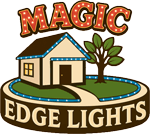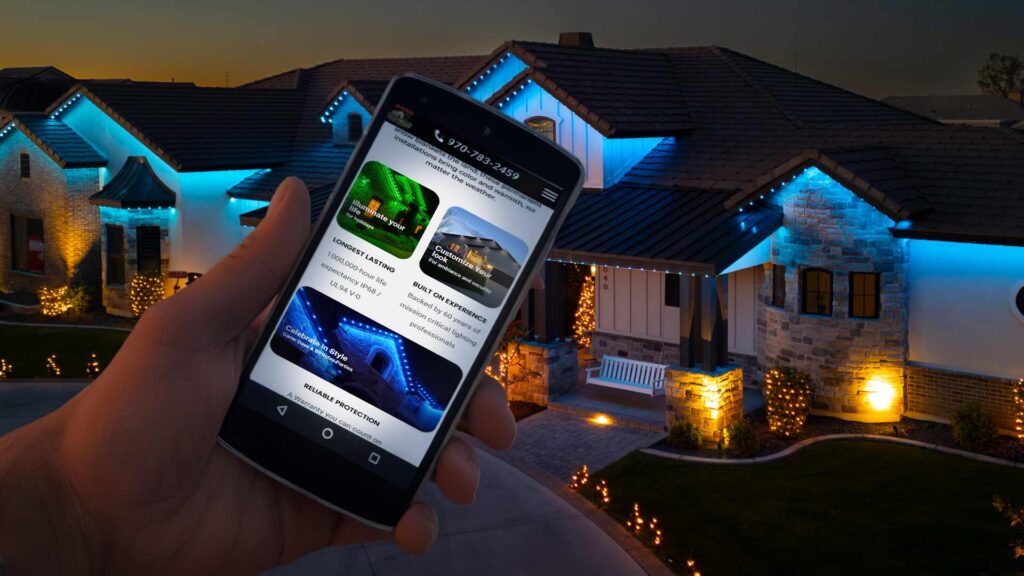By Chad, Owner of Magic Edge Lights
Introduction: The Holiday Lighting Revolution and the price of Permanent Christmas lights.
After two decades in the Christmas lighting industry, I’ve witnessed a dramatic shift in how homeowners approach their holiday decorations. The question I hear most often at Magic Edge Lights isn’t about which colors look best or how to create stunning displays—it’s about whether permanent Christmas lights are worth the investment compared to traditional temporary setups.
“Chad, I’m tired of wrestling with tangled lights every November, but I’m not sure if permanent lights make financial sense,” a customer told me just last week. This sentiment echoes what I hear from hundreds of homeowners each season, and it’s precisely why I’ve compiled this comprehensive cost analysis for 2025.
The Christmas lighting landscape has evolved significantly, with permanent LED systems offering unprecedented durability, energy efficiency, and convenience. However, the upfront investment can seem daunting when compared to the familiar ritual of purchasing and installing temporary lights each year.
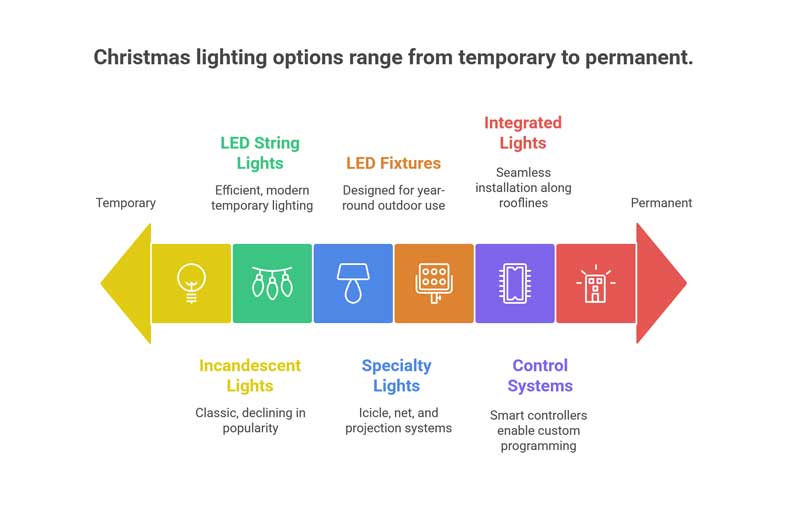
Understanding Your Christmas Lighting Options
Traditional Temporary Christmas Lights
Temporary Christmas lights represent the classic approach most of us grew up with. These systems typically include:
- Incandescent string lights – The traditional choice, though rapidly declining in popularity
- LED string lights – Modern temporary lights with improved efficiency
- Specialty decorative lights – Icicle lights, net lights, and projection systems
- Annual replacement components – Clips, extension cords, timers, and storage solutions
Permanent Christmas Light Systems
Permanent lighting systems represent a paradigm shift in holiday decorating. These installations feature:
- Professional-grade LED fixtures – Designed for year-round outdoor exposure
- Integrated control systems – Smart controllers enabling custom programming
- Architectural integration – Seamless installation along rooflines and landscaping
- Multi-holiday capability – Programming for Christmas, Halloween, Fourth of July, and more
Initial Investment Analysis: Breaking Down the Numbers
Temporary Christmas Light Costs (2025)
The perceived affordability of temporary lights often masks their actual long-term expense. Here’s what homeowners typically spend:
| Component | Budget Option | Mid-Range | Premium |
|---|---|---|---|
| LED String Lights (per 100ft) | $25-$40 | $50-$75 | $80-$120 |
| Installation Hardware | $15-$25 | $30-$50 | $60-$100 |
| Extension Cords & Timers | $20-$35 | $40-$70 | $80-$150 |
| Storage Solutions | $10-$20 | $25-$40 | $50-$80 |
| Hired out for installation | $150-$300 | $250-$500 | $450-$800 |
| Hired out for takedown | $150-$300 | $250-$500 | $450-$800 |
| Annual Total | $370-$720 | $645-$1235 | $1170-$2050 |
“Most people don’t realize they’re spending $300-$2k+ every year on what they consider ‘cheap’ Christmas lights,” I explain to customers. “When you factor in replacement costs, storage, and the time investment, temporary lights aren’t as economical as they appear.”
Permanent Christmas Light Investment (2025)
Professional permanent installations require a significant upfront investment but offer long-term value:
| Per foot | Professional permanent lights |
|---|---|
| 100 linear feet | $3800-$4200 |
| 200 linear feet | $6500-$8000 |
| 400 linear feet | $11,000-$13,000 |
**CALL FOR DECEMBER INSTALLATION AND OFF-SEASON SPECIALS**
| Home Size | Basic Installation | Premium Installation | Luxury Installation |
|---|---|---|---|
| 1,500-2,500 sq ft | $2,500-$4,000 | $4,500-$7,000 | $8,000-$12,000 |
| 2,500-4,000 sq ft | $4,000-$6,500 | $7,000-$11,000 | $12,000-$18,000 |
| 4,000+ sq ft | $6,500-$10,000 | $12,000-$18,000 | $18,000+ |
These figures include professional installation, premium LED fixtures, smart controllers, and comprehensive warranties.
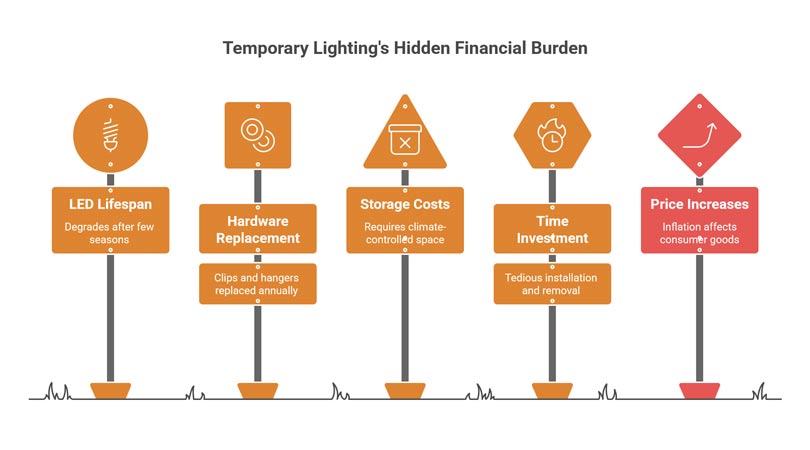
Long-Term Financial Impact: The 10-Year Analysis
The Hidden Costs of Temporary Lights
Annual Replacement and Maintenance Expenses
Even the highest-quality temporary lights face inevitable degradation:
- LED string light lifespan – 3-5 seasons with careful handling
- Hardware replacement – Annual clips, hangers, and mounting solutions
- Storage and organization – Containers, labels, and climate-controlled space
- Time investment – Installation, removal, storage, and replacement shopping
Escalating Replacement Costs
With inflation affecting all consumer goods, temporary light costs continue rising:
- 2025 price increases – 8-12% over 2024 pricing
- Quality degradation – Cheaper imports are reducing the average lifespan
- Labor shortages – Professional installation costs rising 15-20% annually
Permanent Light System Economics
Initial Investment Amortization
When properly installed and maintained, permanent systems offer exceptional longevity:
- LED fixture lifespan – 15-20 years with professional-grade components
- Controller systems – 10-15 years with software updates
- Installation hardware – 20+ years with premium mounting systems
Annual Operating Costs
| Cost Category | Temporary Lights | Permanent Lights |
|---|---|---|
| Energy Usage (3 months) | $85-$150 | $45-$75 |
| Maintenance/Replacement | $150-$300 | $25-$50 |
| Storage Costs | $30-$60 | $0 |
| Insurance Adjustments | $0-$25 | $0 |
| Annual Total | $265-$535 | $70-$125 |
Installation and Maintenance Cost Breakdown
DIY vs Professional Installation Considerations
Temporary Light Installation
Most homeowners install temporary lights themselves, but this “free” labor comes with hidden costs:
- Time investment – 6-12 hours annually for average homes
- Safety risks – Ladder accidents increase 300% during holiday seasons
- Quality compromises – DIY installations often lack weather protection
- Replacement shopping – 2-4 hours annually, selecting and purchasing supplies
“I’ve seen too many homeowners injured attempting roofline installations,” I tell customers. “The time and safety costs of DIY temporary lighting often exceed professional installation fees.”
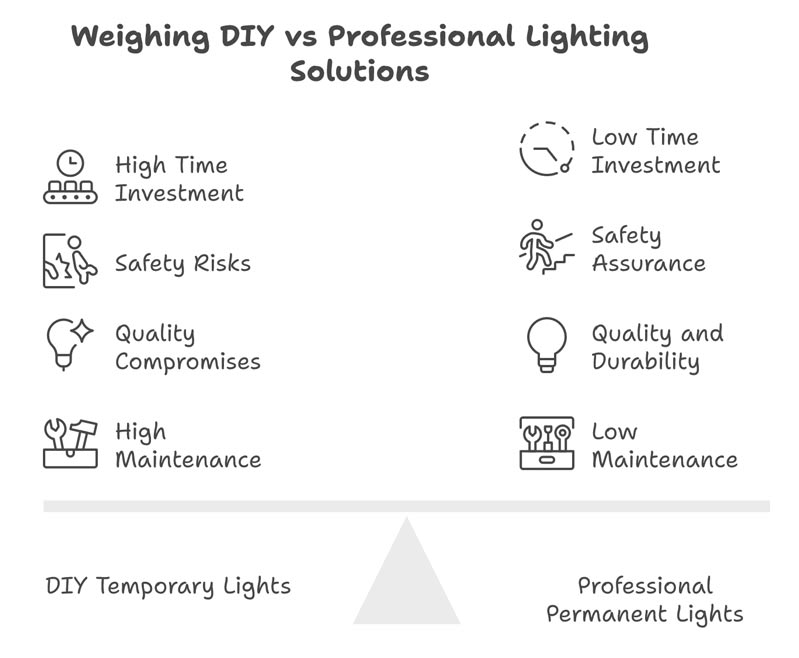
Permanent Light Installation
Professional permanent installations require specialized expertise:
- Electrical integration – Code-compliant wiring and circuit protection
- Architectural planning – Custom layouts maximizing visual impact
- Weather sealing – Premium protection against moisture and UV exposure. Innovative system programming – Advanced controllers enabling custom displays
Ongoing Maintenance Requirements
Temporary Light Maintenance Schedule
- Pre-season testing – 2-3 hours checking and replacing failed bulbs
- Installation process – 6-8 hours for average homes
- Seasonal adjustments – 1-2 hours addressing weather damage
- Removal and storage – 4-6 hours, careful packing and organization
Permanent Light Maintenance Schedule
- Annual inspection – 30 minutes professional system check
- Bulb replacement – 15-30minutes,s addressing occasional failures
- Software updates – 10 minutes automated controller updates
- Deep cleaning – 1 hour annual fixture cleaning
Energy Efficiency and Environmental Impact
Power Consumption Analysis
Modern LED technology has revolutionized Christmas lighting efficiency, but significant differences exist between temporary and permanent systems:
Temporary LED Light Efficiency
- Power draw – 4-6 watts per 100 LED lights
- Controller efficiency – Basic timers waste 5-10% energy
- Installation compromises – Poor connections increase consumption 15-25%
- Seasonal setup – Multiple partial illumination during testing
Permanent LED System Efficiency
- Power draw: 2-4 watts per 100 LED lights. Intelligent controller optimization – Advanced dimming and scheduling
- Professional installation – Optimal connections minimize waste
- Year-round capability – Efficient multi-holiday programming
Environmental Considerations
| Factor | Temporary Lights | Permanent Lights |
|---|---|---|
| Annual Waste Generation | 15-25 lbs | 1-3 lbs |
| Manufacturing Resources | High (annual) | Low (one-time) |
| Transportation Impact | High (annual) | Low (one-time) |
| Lifespan Efficiency | 3-5 years | 15-20 years |
“Permanent systems aren’t just financially smart—they’re environmentally responsible,” I explain to eco-conscious customers. “The reduced waste and resource consumption make them the sustainable choice.”
Practical Considerations Beyond Cost
Convenience and Lifestyle Impact
Time Investment Comparison
The convenience factor often proves more valuable than monetary savings:
Temporary Lights Annual Time Investment:
- Shopping and planning – 3-4 hours
- Installation – 6-8 hours
- Adjustments and repairs – 2-3 hours
- Removal and storage – 4-6 hours
- Total annual time – 15-21 hours
Permanent Lights Annual Time Investment:
- Programming seasonal displays – 30 minutes
- System activation – 5 minutes
- Occasional adjustments – 15 minutes
- Total annual time – 50 minutes
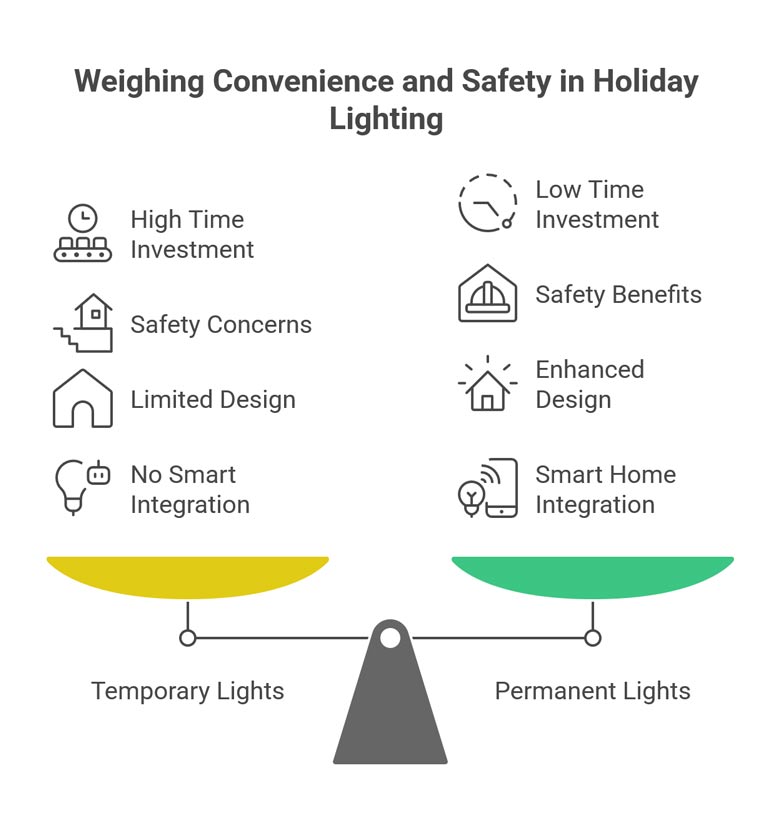
Safety and Insurance Considerations
Insurance companies increasingly recognize the safety benefits of permanent installations:
- Reduced ladder usage – Eliminating annual roofline access
- Professional electrical work – Code-compliant installations
- Weather resistance – Superior protection against holiday storms
- Reduced fire hazards – Professional-grade components and installation
Aesthetic and Functional Advantages
Design Flexibility and Quality
Permanent systems offer superior visual appeal:
- Custom programming – Unlimited color combinations and patterns
- Architectural integration – Seamless roofline and landscape installation
- Consistent illumination – Professional spacing and alignment
- Multi-holiday capability – Christmas, Halloween, Fourth of July programming
Smart Home Integration
Modern permanent systems integrate seamlessly with smart home ecosystems:
- Voice control – Alexa, Google Assistant, and Siri compatibility
- Mobile app control – Remote programming and monitoring
- Automated scheduling – Sunrise/sunset and calendar integration
- Energy monitoring – Real-time consumption tracking
Return on Investment Calculations
Break-Even Analysis by Home Size
Small Homes (1,500-2,500 sq ft)
Permanent System Investment: $3,500 average Annual Temporary Light Costs: $200 average Break-even Timeline: 17.5 years
However, factoring in time savings, safety improvements, and enhanced property value, the practical break-even occurs much sooner.
Medium Homes (2,500-4,000 sq ft)
Permanent System Investment: $7,500 average Annual Temporary Light Costs: $350 average Break-even Timeline: 21.4 years
Large Homes (4,000+ sq ft)
Permanent System Investment: $12,500 average Annual Temporary Light Costs: $500 average Break-even Timeline: 25 years
Value-Added Benefits Beyond Direct Costs
Property Value Enhancement
Real estate professionals report that permanent Christmas light systems add measurable value:
- Curb appeal enhancement – Year-round architectural lighting capability
- Smart home features – Technology integration appeals to modern buyers
- Low maintenance appeal – Reduced ongoing homeowner responsibilities
- Unique selling proposition – Distinctive feature in competitive markets
“I’ve had realtors tell me that homes with permanent lighting systems sell faster and for higher prices,” I share with customers considering their investment. “The convenience and uniqueness appeal to busy modern families.”
Quality of Life Improvements
The intangible benefits often justify the investment alone:
- Stress reduction – Eliminating annual installation struggles
- Safety peace of mind – Professional installation and maintenance
- Extended holiday enjoyment – Easy activation encourages longer display periods
- Community recognition – Distinctive displays enhance neighborhood appeal
Professional Installation vs DIY Considerations
Why Professional Installation Matters
Technical Expertise Requirements
Permanent Christmas light installation demands specialized knowledge:
- Electrical code compliance – Local regulations and safety standards
- Architectural assessment – Optimal mounting points and spacing
- Weather protection – Professional-grade sealing and connections
- System integration – Controller programming and smart home connectivity
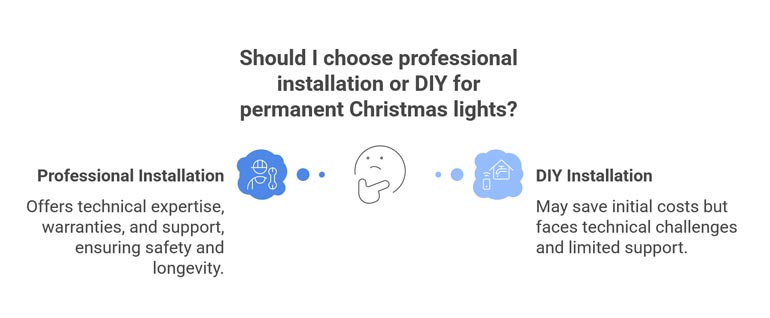
Warranty and Support Considerations
Professional installations include comprehensive protection:
- Installation warranties – 5-10 year artistry guarantees
- Component warranties – Manufacturer protection through authorized dealers
- Technical support – Ongoing assistance with programming and troubleshooting
- Maintenance services – Annual inspections and preventive care
DIY Permanent Light Limitations
While some homeowners attempt DIY permanent installations, significant limitations exist:
Technical Challenges
- Electrical expertise – Code-compliant wiring and circuit protection
- Mounting precision – Proper spacing and alignment requirements
- Component selection – Professional-grade vs consumer-grade products
- Troubleshooting complexity – System diagnosis and repair capabilities
Long-term Support Issues
- Warranty limitations – Manufacturer protection may be voided
- Upgrade challenges – Technology advancement and compatibility
- Maintenance requirements – Specialized tools and replacement parts
- Safety responsibilities – Ongoing electrical and structural integrity
Market Trends and Future Outlook
Technology Advancement Impact
The permanent Christmas lighting industry continues evolving rapidly:
Smart Technology Integration
- Enhanced controllers – More sophisticated programming capabilities
- IoT connectivity – Internet-of-things integration and remote monitoring
- AI optimization – Automated energy management and display enhancement
- Security integration – Coordination with home security and automation systems
Component Improvement
- LED efficiency – Continued improvement in lumens per watt
- Color accuracy – Enhanced RGB and tunable white capabilities
- Durability enhancement – Extended lifespan and weather resistance
- Installation simplification – Improved mounting and connection systems
Industry Growth and Competition
The permanent lighting market expansion benefits consumers:
- Increased competition – More contractors and competitive pricing
- Product standardization – Improved compatibility and replacement availability
- Financing options – Expanded payment plans and financing programs
- Insurance recognition – Growing acceptance and potential premium reductions
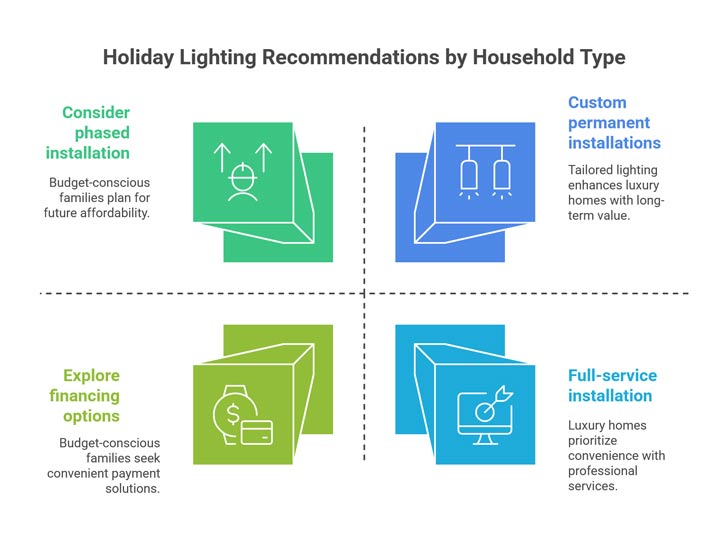
Recommendations by Household Type
Budget-Conscious Families
For families prioritizing immediate affordability:
- Consider phased installation – Start with front-facing areas
- Evaluate total cost of ownership – Include time and replacement costs
- Explore financing options – Many contractors offer payment plans
- Start with premium temporary – Higher-quality lights last longer
Busy Professionals
For households valuing convenience and time savings:
- Permanent systems strongly recommended – Time savings justify investment
- Full-service installation – Professional programming and maintenance
- Smart home integration – Voice control and automation capabilities
- Extended holiday programming – Multiple holiday configurations
Luxury Home Owners
For premium properties requiring exceptional displays:
- Custom permanent installations – Architectural lighting design
- Commercial-grade components – Maximum durability and performance
- Landscape integration – Comprehensive property illumination
- Concierge services – Full-service seasonal programming and maintenance
New Homeowners
For recent home purchasers establishing holiday traditions:
- Long-term planning perspective – Consider 20+ year ownership
- Property value enhancement – Investment in home improvement
- Safety prioritization – Professional installation and maintenance
- Community integration – Distinctive displays build neighborhood connections
Conclusion: Making the Right Choice for Your Family
After analyzing thousands of installations and customer experiences, the financial case for permanent Christmas lights becomes clear when viewed holistically. While the upfront investment seems substantial, the combination of annual savings, time recovery, safety improvements, and quality of life enhancements creates compelling value for most homeowners.
“The happiest customers I serve are those who stopped viewing permanent lights as an expense and started seeing them as an investment,” I reflect on nearly two decades in this business. “They’re investing in convenience, safety, and years of effortless holiday magic.”
The break-even analysis tells only part of the story. When you factor in the 15-20 hours annually spent dealing with temporary lights, the safety risks of ladder work, the frustration of tangled strings and failed bulbs, and the storage challenges, permanent systems offer value far beyond their price tag.
For 2025, my recommendation is clear: if you plan to remain in your home for more than 5-7 years and value convenience, safety, and superior aesthetics, permanent Christmas lights represent a wise investment. The technology has matured, installation costs have stabilized, and the long-term benefits far outweigh the initial expense.
The choice isn’t just about Christmas lights—it’s about choosing convenience over hassle, safety over risk, and permanent beauty over temporary compromise. In my experience, families who make the transition never look back, and their only regret is waiting so long to make the switch.
As we move forward in 2025, I expect permanent Christmas lighting to become the standard rather than the exception. Early adopters will enjoy years of effortless holiday displays while their neighbors continue wrestling with tangled lights and annual installation struggles.
The question isn’t whether you can afford permanent Christmas lights—it’s whether you can afford to keep spending time, money, and energy on temporary solutions that become more expensive and inconvenient each year.
Ready to explore permanent Christmas lighting for your home? Contact Magic Edge Lights for a personalized consultation and discover how we can transform your holiday decorating experience forever.
